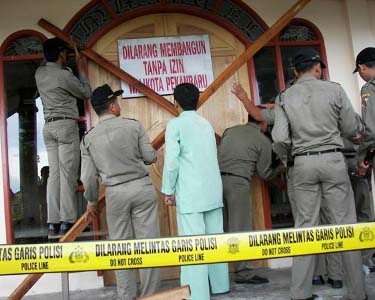Court Reverses Revocation of Indonesian Church’s Building Permit
Court Reverses Revocation of Indonesian Church’s Building Permit court in West Java, Indonesia, has reversed the revocation of a Catholic church’s building permit.
court in West Java, Indonesia, has reversed the revocation of a Catholic church’s building permit.
The Purwakarta regency government had revoked the building permit for Santa Maria Catholic Church when Islamists threatened local residents and officials into opposing the project, church leaders said.
The church sued the Purwakarta regency for revoking the approved building permit in Cinangka village last October, and in a little-publicized court ruling on Feb. 25, a judge in a state court in Bandung, West Java decided in favor of the church.
“The error arose when external forces pressured the Purwakarta government so much that it revoked the building permit,” the head of the church legal team, Dr. Liona Nanang, told Compass. “Government sources have admitted that this was done because of outside pressure.”
The church official said objections to the church under construction did not come from residents of Cinangka village, where the church is located.
“We called the village headman and the block captains to testify,” Nanang said. “According to them, the objections are not from Cinangka villagers, but from citizens of Cikampek, which is not even in our district [county].”
The Purwakarta government is planning to appeal the case, but Nanang said church lawyers are optimistic that construction likely would resume once the High Court in Jakarta rules.
On Oct. 16 the regent of Purwakarta regency, Dedi Mulyadi, revoked the construction permit after Islamists threatened some of the local residents whose approval is required by Indonesian law. Church leaders said members of the Islamic Defenders Front (Front Pembela Islam, or FPI) “continually terrorized” both the regent and residents who had previously given their approval.
A Joint Ministerial Decree promulgated in 1969 and revised in 2006 requires the permission of more than 60 neighbors and a permit from local authorities to establish a place of worship. The more than 60 local citizens giving their approval must provide photocopies of their identity cards.
Nanang said that the judge agreed with the plaintiff that there had not been any irregularities in the process of obtaining a building permit. The judge found that the Purwakarta government had violated basic principles of good government including justice and the rule of law.
“A building permit can be legally cancelled if there is no construction activity within six months of the date of publication of the permit,” Liona told Compass. “However, Santa Maria Church began to build immediately.”
The court also ruled that the Purwakarta government had no legal reason to revoke the building permit. The Joint Ministerial Decree Number requires not only a minimum of 60 signatures of those not using the building but a minimum of 90 signatures of those who will use it, and the church had obtained the signatures of 93 non-users and 170 church members who would use the building.
The Rev. Augustinus Made of Santa Maria Catholic Church concurred that revocation of the building permit came about from extremely heavy pressure from the FPI and other radical Muslim groups.
“We rejoice in the verdict,” he said. “We had fulfilled all of the regulations. We built on land that had been zoned for a house of worship – land that we purchased.”
At the time the building permit was revoked, land had been prepared, the area fenced and the foundation laid.
The church had planned its building on a 5,000-square meter lot in a sparsely populated industrial area on land zoned for houses of worship. The congregation of over 1,000 has been worshipping in a steel factory warehouse some distance from the building site since its inception in 2002.
The lot developer had supplied facilities for all faiths; Muslims have two large mosques and an Islamic chapel at each factory. The government plan for the Bukit Indah Industrial Park included facilities for general and social purposes, including places of worship.














































